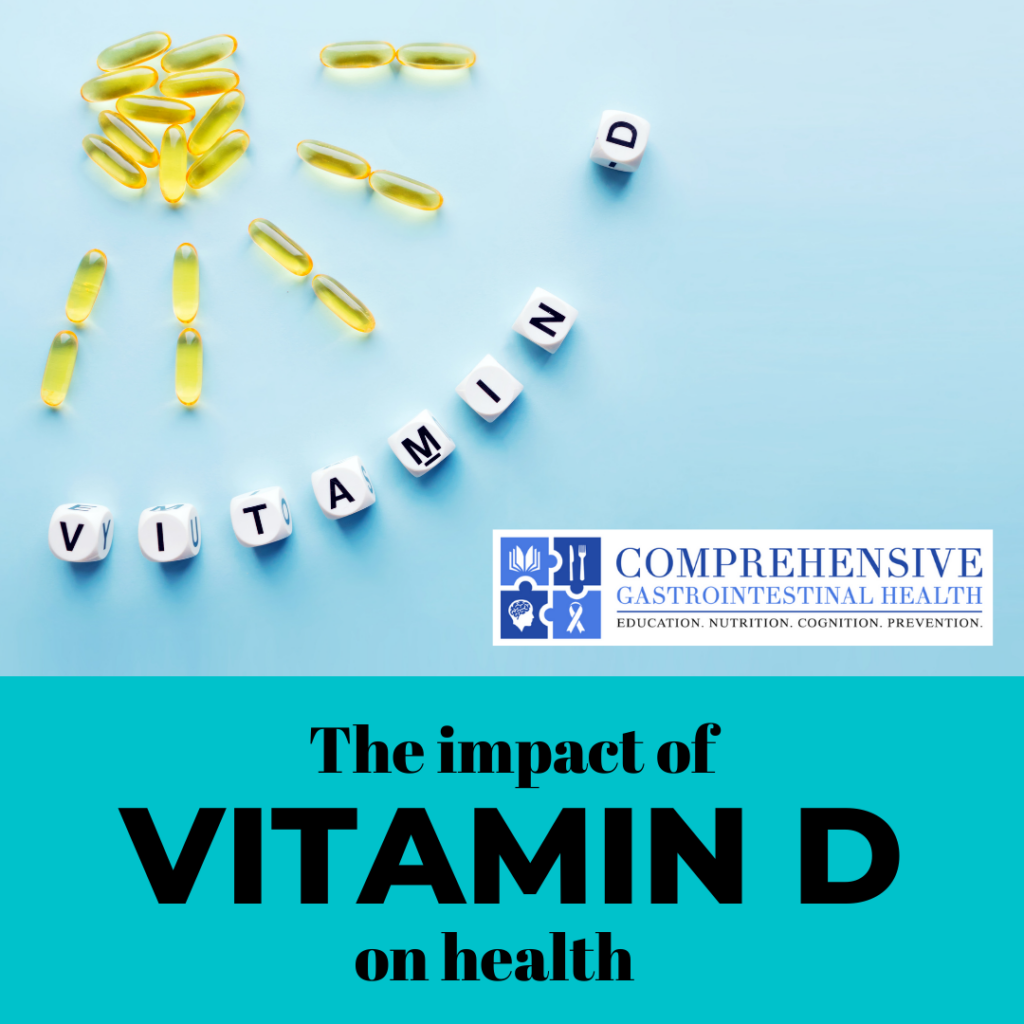The Impact of Vitamin D on Health
The Impact of Vitamin D on Health
by Danielle Genenz, RD
Vitamin D is unique from any other vitamins. It’s actually a steroid hormone made from cholesterol when skin is exposed to the sun, thus often called the sunshine vitamin. Vitamin D dissolves in the presence of fat and can be stored in body fat for up to months. Few foods contain the vitamin so if you don’t eat them or lack enough sun exposure, a deficiency is likely. In fact, about 41.6% of the Americans have a deficiency.
FUNCTIONS
Receptors for vitamin D are found in every cell of the body. When bound to cells, the vitamin can turn on and off genes that regulate cell growth, differentiation, and survival. These functions are linked to many benefits including the absorption of calcium and phosphorus in your gut leading to proper bone health. It may also play a role in better immunity, emotional health, heart disease prevention, dementia avoidance, and protection against cancer.
SPOTLIGHTING A LINK TO COLON CANCER
Researchers at the University of California, San Diego posted a study in July 2021 tracking people in 186 countries. Those with the lowest exposure to sunlight had an increased colon cancer risk, especially in older adults. An article from Journal of the National Cancer Institute in 2018 looked at over 5700 case studies and founds individuals with vitamin D deficiency had a 31% higher risk of colon cancer compared to those with normal levels. A meta-analysis study from 2018 analyzing several epidemiological studies also reflect an association of vitamin D deficiency to increased rates of colon cancer and the promotion of unhealthy gut bacteria.
NEEDS
Research compiled to create the 2020-2025 Dietary Guidelines for Americans has prompted new RDI’s listed on food labels to double from 400 to 800 IUs per day. If you have a deficiency, contact your doctor to prescribe the right amount for you.
STRATEGIES TO INCREASE VITAMIN D:
- Get outside within reason – 10-30 minutes of midday sunlight exposure meets average needs.
- Eat food sources of vitamin D: cod liver oil, mushrooms, sardines, wild-caught salmon, mackerel, tuna, egg yolks, beef liver and fortified foods, i.e. fortified dairy products, cereals, and orange juice.
- Take a vitamin D supplement if recommended by your physician.
To learn more ways to improve your vitamin D levels and overall health, schedule a visit with one of our practitioners at 224-407-4400 or at www.compgihealth.com
Resources:
Could age increase the strength of inverse association between ultraviolet B exposure and colorectal cancer? BMC Public Health 2021; 21: 1238. Could age increase the strength of inverse association between ultraviolet B exposure and colorectal cancer? (nih.gov)
Circulating Vitamin D and Colorectal Cancer Risk: An International Pooling Project of 17 Cohorts
JNCI: Journal of the National Cancer Institute, Volume 111, Issue 2, February 2019, Pages 158–169. Circulating Vitamin D and Colorectal Cancer Risk: An International Pooling Project of 17 Cohorts | JNCI: Journal of the National Cancer Institute | Oxford Academic (oup.com)
Eur J Nutr, 2018 Oct 15., 58(7): 2895-2910. Vitamin D and the gut microbiome: a systematic review of in vivo studies. Vitamin D and the gut microbiome: a systematic review of in vivo studies – PubMed (nih.gov)

